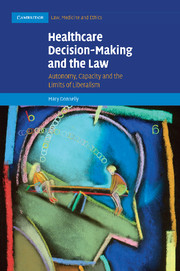Book contents
- Frontmatter
- Contents
- Acknowledgements
- List of cases
- List of legislation
- Introduction
- 1 Autonomy: variations on a principle
- 2 Autonomy in the law
- 3 Capacity: the gatekeeper for autonomy
- 4 Capacity assessment in practice
- 5 Autonomy, rights and decision-making for patients lacking capacity
- 6 Treatment for a mental disorder: a case apart?
- Conclusion
- Bibliography
- Index
- References
4 - Capacity assessment in practice
Published online by Cambridge University Press: 04 February 2011
- Frontmatter
- Contents
- Acknowledgements
- List of cases
- List of legislation
- Introduction
- 1 Autonomy: variations on a principle
- 2 Autonomy in the law
- 3 Capacity: the gatekeeper for autonomy
- 4 Capacity assessment in practice
- 5 Autonomy, rights and decision-making for patients lacking capacity
- 6 Treatment for a mental disorder: a case apart?
- Conclusion
- Bibliography
- Index
- References
Summary
In Re B (Adult: Refusal of Medical Treatment), Dame Butler-Sloss P described the test for capacity as ‘clear and easily to be understood by lawyers’. In fact, as this chapter shows, while the outline of the legal test may be stated with ease, what the test actually means is far from clear. Lord Phillips CJ was perhaps nearer the mark when he described capacity as ‘an important, but by no means straightforward concept under English law’. The lack of clarity increases the likelihood of assessors including their own views regarding the appropriateness of the patient's decision as part of the assessment of whether or not she has capacity. The legal test, however, represents just one part of the overall framework for capacity assessment in practice. The kind of process employed in testing for capacity is crucial both in ensuring accurate assessments and in developing the capacity of the person assessed, as is required under the Mental Capacity Act 2005 (MCA). In this respect, formal judicial determinations of capacity comprise a very small proportion of such determinations. For the most part, the law has delegated the function of assessing capacity to non-judicial assessors. These are primarily healthcare professionals, and in most serious cases involving healthcare decisions, they are likely to be medical professionals. Furthermore, even when capacity is judicially determined, judicial conclusions are heavily reliant on expert evidence from professionals.
- Type
- Chapter
- Information
- Healthcare Decision-Making and the LawAutonomy, Capacity and the Limits of Liberalism, pp. 131 - 175Publisher: Cambridge University PressPrint publication year: 2010

